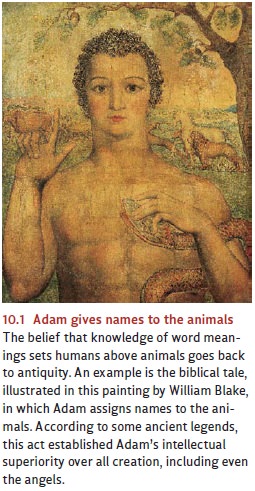Chapter: Psychology: Language
Psychology: Language
Language
It’s a pretty good bet that if
Martian psychologists camedown (or is it “up”?) to Earth to investigate its
creatures, they wouldn’t immediately pick out the humans as being an especially
remarkable example. After all, we don’t have the lion’s magnificent mane, the
soaring flight of the eagle, the peacock’s extrav-agant feathers, the
elephant’s impressive bulk or the shark’s rapacious bite. In fact, ours seems a
rather unspectacular species—dull of tooth and short of claw, awk-wardly
bobbing along on two legs with our patchy coats and pointy noses. We don’t even
have whiskers or tails.
But we humans have one unique
glory that apes can’t ape, crows can’t crow about, and parrots can only parrot.
We have the gift of language, and we have always under-stood the power it
conveys, allowing us to leapfrog beyond the other creatures. As the Bible puts
it, “The man gave names to all the cattle, and to the birds of the sky, and to
every beast of the field” while even the most linguistically gifted animals can
muster little more language than “Give me bananas,” “D’oh! Snake!” and “Hey
there, pal!” Echoing the Bible’s words, the 17th-century philosopher René
Descartes wrote that language is the mental function that sets us apart from
all other beasts and is “the sole sign and only certain mark of thought hidden
and wrapped up in the body” (Figure 10.1).

Today, scientific opinion
continues to give the same prominence to language that our forebears did,
recognizing it as a crucial cornerstone of human mental life.
Armed with language, we not only
can name all the things and creatures around us. We can transcend the
here-and-now that surrounds and confines the mentality of all other animals. We
can build bridges between the actual and the impossible; the con-crete and the
abstract; the physical and the mental; the past, present, and future; the
ordinary and the sublime and, last but not least, with words and sentences we
fashion a mental bridge between your brain and mine. Going on to recraft our
language into squiggles and scratches on clay or stone or paper, we can store
our thoughts forever, sending them down through time to generations of
humankind as yet unborn.
In these ways and more, language
obviously serves the crucial purpose of con-veying information and ideas from
person to person and from generation to gener-ation. Yet the role of language
in human life lies yet deeper than this. Conversation is embedded in the
fundamental social fabric of our species’ existence, starting to show itself
even in infants a few months old and thus too young to sit up unaided or feed
themselves, no less to understand any meaningful word. All the same, these
smallest members of the human race have the rudimentary rhythms and tones of
language stored in their genes, and so they happily babble and coo away their
days. And their adult caretakers babble quite meaninglessly in return as the
family and community forge social bonds using the sounds of language as a
central medium. As Charles Darwin writes, language is “the sweet music of our
species,” the life-long vehicle of our sociality as well as the transmission
medium for our deepest thoughts, beliefs, and ideas. Humans have often been
defined as “the creatures who think.” One might as justly define them as “the
creatures who gossip” (or who text, or who tweet).
Related Topics